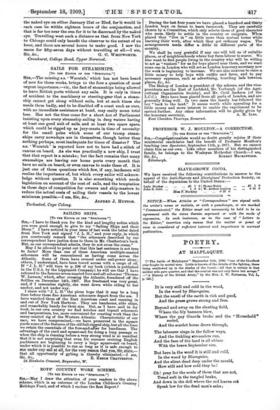SAILING SHIPS.
[To THE EDITOR OF THE " SPECTATOR."3 Sra,—I have to thank you for the kind and lengthy notice which you were good enough to give to my " Sailing Ships and their Story." I have noticed in your issue of last week the letter dated from New York and signed " J. L. H.," and your reply, in which you courteously remark that " the schooners described by our correspondent have justice done to them in Mr. Chatterton's book. But, as our correspondent admits, they do not eross the ocean."
May I be allowed to point out that this last sentence is not true to facts ? More than one of these American multiple-masted schooners will be remembered as having come across the Atlantic. Some of them have crossed under sail-power alone ; others, I understand, have been towed across with a cargo of oil. If " J. L. H." will turn to p. 296 of my book (which is published in the U.S.A. by the Lippincott Company) he will see that I have referred to the famous seven-masted fore-and-aft schooner 'Thomas W. Lawson,' which, after crossing the Atlantic, foundered off the Scillies on December 14th, 1907. Her freeboard was very great, and, if I remember rightly, she went down while riding to her anchor, and not under way.
I share with "J. L. H." the pious hope that it may be a long
time before these fine American schooners depart from the sea. I have watched them off the East American coast and running in and out of New York Harbour. They are handsome, able ships, and remarkably handy for their size. But, as 'I have said in my book, in our own country we find ketches and topsail schooners and barquentines, too, more convenient for coasting work than the many-masted rig of the Western Atlantic. Characteristic of our race, we have compromised,—we have preserved in the square yards some of the features of the old full-rigged ship, but all the time we retain the essentials of the fore-and-after for handiness. The advantage of the yard and square-sail for doing a long passage or when the ship is running before a very strong wind is so manifest that it is not surprising that even for summer cruising English yachtsmen are beginning to carry a "large square-sail on board,
under which it is possible to run as long as it is safe enough to run under any sail at all, for the very reason that you, Sir, state,— that all opportunity of gybing is thereby eliminated.—I am, Sir, &c., E. Kaska CHATTERTON. 24 Blenheim Crescent, Bayswater, W.










































 Previous page
Previous page